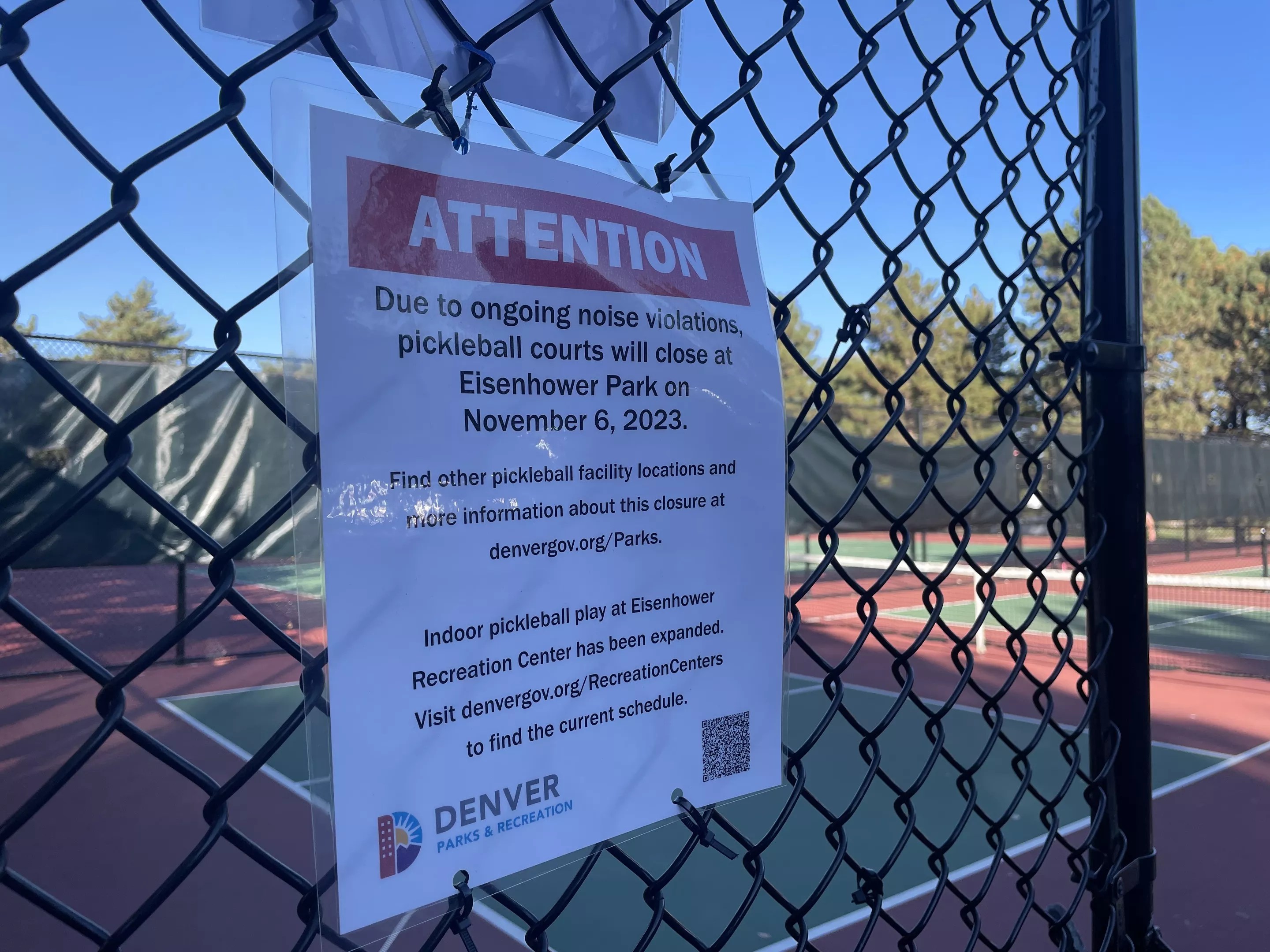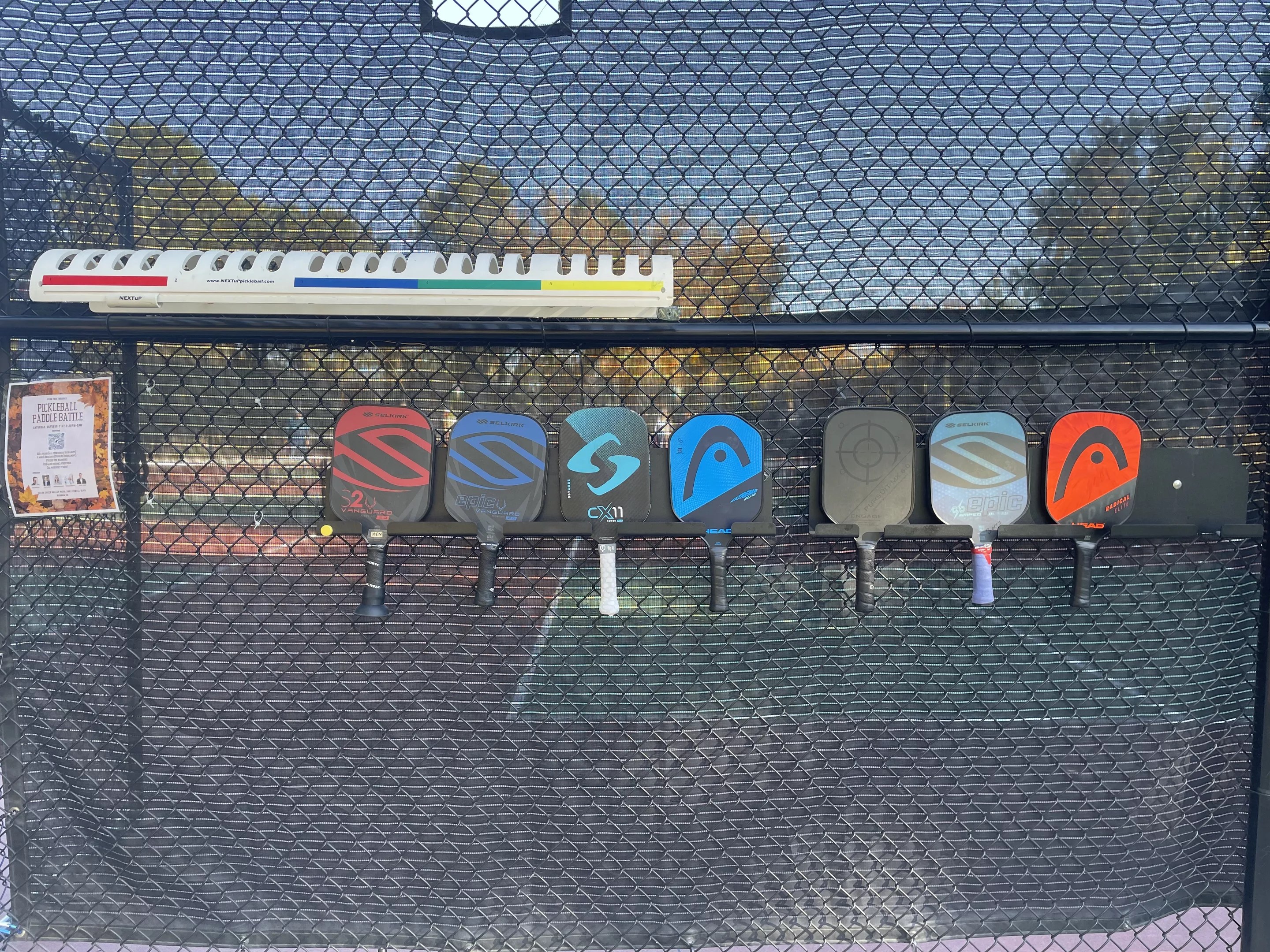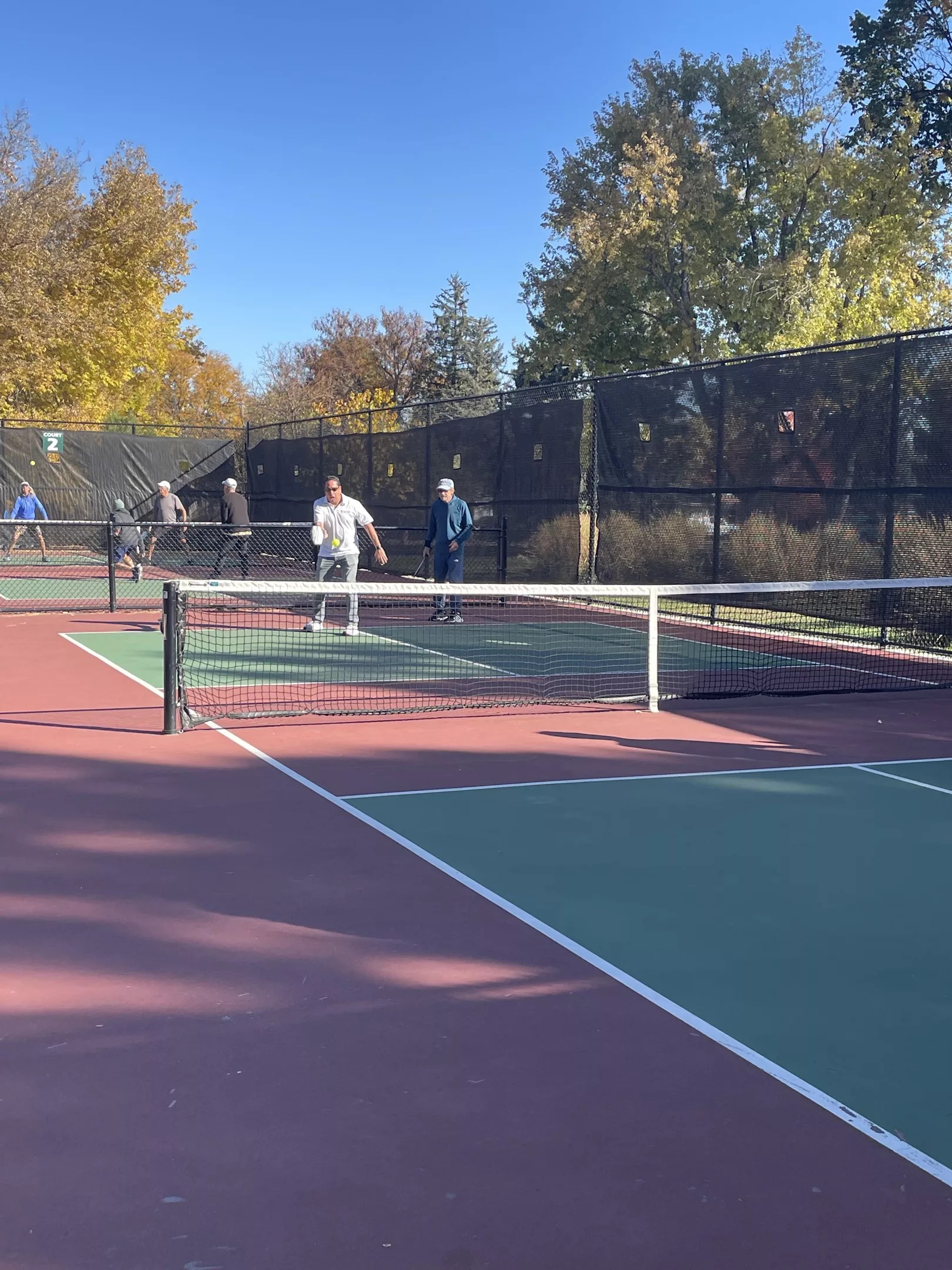
Catie Cheshire

Audio By Carbonatix
Joanie Seay, a longtime tennis player, got introduced to pickleball by a friend who took her to play at the four courts at Mamie D. Eisenhower Park in Denver in 2020. When that friend later died from cancer, the Eisenhower pickleball community was there for his wife – showing just how much of a second family the sport can provide.
Next month, the city plans to close all four courts because of noise complaints and will be converting them back to tennis courts.
In addition to Seay, countless others have formed bonds with pickleballers at the 4300 East Dartmouth Avenue park, and many are devastated.
Minnesota transplant Michele Olson didn’t know anyone except her daughter when she moved to Denver in 2017. She made friends by playing pickleball at Eisenhower Park.
“Now I have support,” Olson says. “There isn’t one person here that I knew before pickleball, and now I know most of them.”
On weekdays, there’s a reliable group of retirees who come to play in the mornings. Stop by and you might just get a tip on where the best sushi deals are from Stan Poladsky, another active pickler there. On weekends and evenings, younger people join in on the fun.
“These kids are so nice,” Seay says. “You see all of us playing together and having a great time. And it’s not like, ‘Oh, we have to play with Joanie, she’s so old’ – although I have to say that I hold my own against them. But it’s such a great group of people there. It’s like nothing I have ever seen.”
Seay, Olson and the rest of the crew are worried they’ll lose that community on November 6 – the date when the pickleball courts are scheduled to close.
In Denver, Eisenhower is the second set of public courts to close because of noise issues, following the closures at Congress Park in April. Scott Gilmore, deputy executive director of Denver Parks & Recreation, says noise has been a concern at Eisenhower since as far back as 2019.
“There’s a gentleman who would send us stuff, and he created his own fake [Registered Neighborhood Organization], which we never could verify the address of,” Gilmore says.
Because the department couldn’t actually find the location of the sound issues, it couldn’t do anything. But this year, the Denver Department of Public Health & Environment (DDPHE) received several noise complaints from those living near the park and went out to investigate.
A DDPHE spokesperson confirms to Westword that investigators have responded to four noise complaints since April, and sound measurement data from those addresses “indicates violations to the noise ordinance when people are playing pickleball – specifically, the sound of the ball hitting the paddle.”
“If it was really bad noise, I could get it. I could understand it,” Seay says. “But these courts are not that close at all to the houses around Eisenhower, and there’s so many trees that would help alleviate some of the noise, I believe. … It’s just such a good community that it’s hard to be open.”
In July, Gilmore brokered a deal with those who live near the courts to keep them open for the summer. He was concerned that – on the heels of shutting down the popular Congress Park courts – shuttering Eisenhower right away would mean there weren’t enough places for people to get their pickle on.
“Would you mind if we kind of worked together and tried to extend this as long as possible?” Gilmore recalls asking neighbors. “I got community members to basically allow pickleball to continue being played there till this fall.”
Since April, the parks department has added six temporary courts at Martin Luther King Jr. Park to help make up the difference after closures, according to Gilmore.
Olson is trying to put together a directory of Eisenhower picklers so they can keep in touch. She wonders why they weren’t informed earlier of there being a potential that the courts could close.
“We’ve only had a few weeks,” she says.
According to Gilmore, people should have been aware that there were noise issues at the park because the courts have had hours of 8 a.m. to 8 p.m. for years to try to limit noise. Since June, park rangers had also been going out each day to lock and unlock the courts at those times to enforce the posted limits.
“So for some people to say, ‘Well, we didn’t know that this was an issue,’ I don’t think that rangers would be showing up every night at eight o’clock to lock the courts if there was no issue,” Gilmore points out.

The courts are so popular that people line up their paddles to wait for a turn.
Catie Cheshire
The longtime parks official went to Eisenhower on October 25 to explain the reasoning for the closure to players ahead of a planned October 27 meeting initiated by Poladsky. Westword also happened to be there to get photos and speak with community members.
“Do you really think I enjoy being the person that says, ‘Okay, we have to close these courts’ and have everybody mad at me?” Gilmore asks Westword. “That’s not what I signed up for as a park director.”
He expressed the same to those gathered at the park.
Steve Haverl, an Eisenhower pickler, asked Gilmore a question that came up after the Congress Park closure, too: How is it fair that just a few homeowners can supersede hundreds of pickleball players?
“This is an urban environment; no one lives in a tomb in an urban environment,” Haverl questioned. “At the core, it’s a question of fairness. We’re all equal taxpayers.”
As Gilmore has maintained through this process, it’s actually a question of legality: Because noise from pickleball violates the city noise ordinance, it can’t be allowed to continue. Just because it’s operated by a city department rather than a private business owner doesn’t mean the rules don’t apply.
Haverl suggested the law should be scrutinized, and went on to discuss the strong community bonds being formed on the courts with Gilmore, who said it reminds him of something far more sinister.
“The Crips and Bloods, those [gang] organizations, they grew because people were looking for families,” Gilmore responded. “This is no different.”
He also told those gathered at Eisenhower that the parks department knows it didn’t initially do the right thing when it came to pickleball; it didn’t anticipate how the sport would grow or how intense game play would become, he said.
“We made mistakes because we built courts that were too close to people’s homes,” Gilmore admitted. “We’re trying to now take the steps to make sure that we don’t do that anymore and we build courts in the right place.”
The city is now looking at courts at least 500 feet away from homes and in locations not occupied by tennis courts, according to Gilmore, who calls it progress.

Scott Gilmore jumped in for a game.
Catie Cheshire
His way of thinking: The city lost four courts at Congress Park and four at Eisenhower, for a total of eight down; the city also canceled a plan to put four courts at Sloan’s Lake Park and an additional four at Congress Park, but added six temporary courts at MLK that will be converted into permanent courts in the next year.
Denver officials are working with a developer that is building a public park near 70th and Tower Road to add courts there, and it is going to add at least six courts at the Lowry Sports Complex as it works to revamp the space. Gilmore says the city is also probing whether to put four courts at Rosamond Park in southeast Denver.
“So in the next two years – say, through 2025 – we are planning on adding twenty courts,” he tells Westword. “Hopefully, we’re sending a message out we’re on this, and we’re trying our best to build courts as quickly as possible. It’s not going to happen overnight, but we’ve got plans to start addressing the shortages of courts.”
As some picklers see it, the calculation isn’t as sunny.
Seay says with a projection of 2026 for the Rosamond courts to be built, she isn’t encouraged. “Some of us are old playing there, so are we even going to be around then?” she questions. “We were all cracking up about that today while we were playing pickleball.”
The parks department instituted a Pickleball Advisory Group in April. Marc Nelson, who chairs the Denver Pickleball Association, is a member of the group. He says the advisory group was told that the Eisenhower courts would close and its official recommendation was not to do it until the courts at Lowry were constructed.
As Nelson sees it, until new courts are actually built, the city is still running a deficit of ten courts from what was planned or existed to what is available now.
Gilmore says he worked well with Nelson to set up the new MLK courts and get paddle racks added to playing areas around Denver. Nelson agrees that those efforts have been positive, but he still hopes for more for pickleball in Denver.
According to Nelson, the advisory committee is planning a list of items it wants incoming parks director Jolon Clark to address, including the public notice process and information about how many noise violations it really takes to shut a court down.
In the meantime, Gilmore says the department has asked for $2.5 million to be allocated to make the MLK courts permanent, construct some at Lowry and start on designs for Rosamond.
It won’t – to the chagrin of picklers around the city – be devoting any money to sound mitigation in the form of Acoustiblok, a soundproofing material that can be attached to fences. Gilmore says to do so would be too expensive, in part because the fences around courts would need to be reinforced to be strong enough to hold the material.
“They don’t guarantee that they’re going to soften the noise enough to make it so it doesn’t violate the noise ordinance,” he says.
Picklers, including several of the citizens at Eisenhower on October 27, wish Denver would try making it work.
Nelson adds that even those on the city’s committee haven’t been shown designs that indicate it wouldn’t fix the noise problems. For now, Gilmore is focused on building courts where noise just isn’t a problem.
“I didn’t create pickleball, but we as a parks department have to work with what we know now,” Gilmore says. “I didn’t create this issue, because I didn’t start the pickleball sport.”
What the Eisenhower pickleball players know is this: They’re grateful for their time at these courts together.
“It really is just an amazing place, and it’s people who really care for each other there,” Seay says. “We all love each other.”